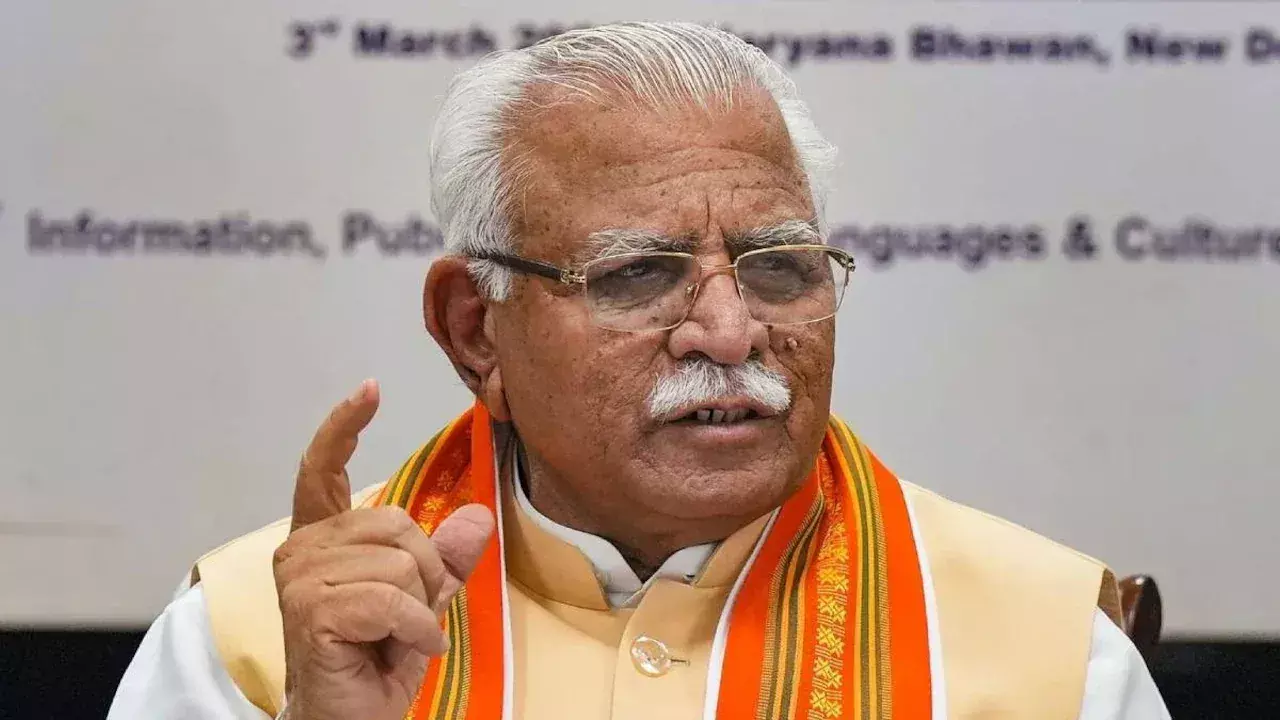TRENDING TAGS :
Biography of Manohar Lal Khattar: From a Farmer’s Son to Chief Minister
Discover the inspiring biography of Manohar Lal Khattar, tracing his journey from a farmer’s son in Haryana to Chief Minister and Union Minister, showcasing his disciplined, transparent leadership and lasting political legacy.
Manohar Lal Khattar (PC- Social Media)
Date of Birth:
May 5, 1954
Place of Birth:
Nidana village, Rohtak district, Haryana
Political Party:
Bharatiya Janata Party (BJP)
From a Farmer’s Family to the Office of Chief Minister
In the political landscape of Haryana, Manohar Lal Khattar emerged as a leader who challenged the traditional dominance of Jat politics. He established his identity as the Chief Minister of the state’s first full-majority BJP government. His journey from an RSS pracharak (campaigner) to Chief Minister is not only inspirational but also serves as a benchmark for organization-based leadership in Indian politics.
Currently, Khattar serves as the Union Minister of Power and Urban Development in the Government of India. He assumed office on June 9, 2024, during Prime Minister Modi’s third term (Modi 3.0). Prior to this, he served as the Chief Minister of Haryana from October 2014 to March 2024.
Khattar was a full-time pracharak of the Rashtriya Swayamsevak Sangh (RSS) before formally joining the BJP in 1994. His political life has been marked by simplicity, service, and transparency.
Early Life and Background
Manohar Lal Khattar was born on May 5, 1954, in Nidana village, Rohtak district, Haryana, into a modest farming family. He belongs to the Punjabi Khatri community. His family migrated to India from Montgomery district (now Sahiwal, Pakistan) during the 1947 partition. His childhood was marked by hardships, which he turned into stepping stones for personal development. From a young age, he worked in his family’s fields, gaining firsthand understanding of rural life—an experience that would later inform his administrative decisions.
Education and RSS Affiliation
Khattar received his early education in Rohtak and later graduated from Delhi University. During his student years, he became associated with the RSS. In 1977, he dedicated his life as a full-time pracharak. Over 14 years, he worked in various capacities within the RSS, developing a deep understanding of discipline, organization, and ideology. During this time, he played a key role in organizational development and public outreach in Haryana and neighboring states.
Entry into Politics
In 1994, Khattar formally joined the Bharatiya Janata Party and stepped into active politics. Initially, he served as the organization secretary for the BJP’s Haryana unit. His working style, discipline, and honesty earned him the trust of the party’s top leadership. Between 2005 and 2009, he focused on strengthening the party at the grassroots level, earning popularity among party workers.
2014 Elections and Rise to Chief Minister
In the 2014 Haryana Assembly elections, the BJP secured a full majority for the first time. Khattar contested and won from the Karnal Assembly seat. He was elected leader of the BJP legislative party and took oath as the 10th Chief Minister of Haryana on October 26, 2014. Notably, he became the first non-Jat Chief Minister of the state, marking a significant shift in the caste-driven politics of Haryana. Prior to this, the Jat community had largely dominated the political leadership. The BJP played a strategic gamble by promoting Khattar and reshaping social and electoral equations—which proved successful.
Administrative Approach and Governance Style
As Chief Minister, Khattar focused heavily on transparency and digital governance. He launched initiatives like the “CM Window,” an online complaint redressal system, e-billing, and e-registration, which brought direct benefits of government services to the public. He also implemented strict anti-corruption measures and reinforced accountability in the bureaucracy. Under his leadership, various recruitment processes were made more transparent, thereby boosting the youth’s trust in the government machinery.
Re-election and Challenges of Second Term
In the 2019 Assembly elections, the BJP did not secure an outright majority but managed to form the government with the support of the Jannayak Janata Party (JJP) and independent MLAs. Khattar was sworn in as Chief Minister for a second term. However, the coalition politics and the intense farmers’ agitation posed serious challenges. The protests erupted in response to the central government’s three farm laws, and Haryana witnessed widespread demonstrations. Khattar’s administration faced sharp criticism from the opposition, yet he maintained a delicate balance of restraint and firmness in dealing with the situation.
Resignation and Succession
On March 12, 2024, Manohar Lal Khattar resigned from the post of Chief Minister, leading to a change in leadership within the Haryana BJP. Nayab Singh Saini was appointed the new Chief Minister. Khattar’s decision reflected his commitment to the party organization, prioritizing party interest over personal position.
Political Image and Public Service
Khattar is known for his image as an honest, disciplined, and development-oriented leader. He believes in simple living and high thinking. Remaining unmarried, he has dedicated himself entirely to public service.
He extended strong support to the ‘Beti Bachao, Beti Padhao’ (Save the Girl Child, Educate the Girl Child) campaign and implemented various schemes for women’s empowerment. Additionally, he made notable contributions to strengthening Panchayati Raj institutions and developing urban infrastructure.
He is among the rare leaders who have upheld ideological and organizational values while running a government. Under his leadership, Haryana witnessed transformation, and its politics found a new direction. The BJP expanded its base among non-Jat communities, offering a viable political alternative. Khattar’s government will be remembered for bringing administrative reforms through technology and for promoting a governance model beyond caste-based politics.
Manohar Lal Khattar’s life and work set an example of service, discipline, and integrity in politics.


